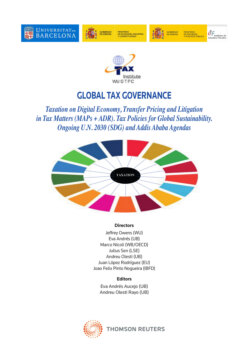Читать книгу Global Tax Governance. Taxation on Digital Economy, Transfer Pricing and Litigation in Tax Matters (MAPs + ADR) Policies for Global Sustainability. Ongoing U.N. 2030 (SDG) and Addis Ababa Agendas - Jeffrey Owens - Страница 10
На сайте Литреса книга снята с продажи.
2. WHAT IS AT STAKE FOR THE EU IN THE CURRENT DEBATE ON INTERNATIONAL TAX RULES?
ОглавлениеShort answer is much! With COVID-19 magnifying inequities and inequalities between and among countries, politicians need to show that the cost of the current health and economic crisis are being fairly shared and in particular that MNE and HNWI are paying their “fair” share of taxes, especially as we enter the exit phase of the crisis which will see countries having to increase their taxes.
Governments already are under pressure to ensure that traditional bricks and mortar companies are not being disadvantaged by our tax rules (that reminds me of the debate at the turn of the 20th century on relative taxation of horses and cars! And we know who won that debate).
Also recent data suggest that the problem with the GAFA is not so much that their Global tax burden is lower than that of traditional businesses but that the tax is paid in the US not in the countries where they operate. It’s also important that EU MNE are not at a competitive disadvantage vis-a-vis MNE from third countries such as China and the US which is why a global consensus is important.
The EU should take a lead in shaping a consensus that works for the EU but has sufficient support to generate global support (which will give greatest certainty to taxpayers and governments).
This is why it’s appropriate that the EU should continue to explore how any consensus that emerges from the G20 can be implemented within the EU. And if there is not a global consensus the EU needs a plan B:
– Whether it’s a harmonized DST (with 10 MS already having a DST this may be a challenge) perhaps alongside non-EU countries looking to the EU for leadership.
– Pushing forward on the CCBT (Maybe the G20 initiative could help this long stalled project to move forward), perhaps under a new name.
– Or looking at minimum tax proposals, perhaps along the lines of the Ruding proposals.
At this stage it seems likely that there will be a consensus reached in October 2021 under the Italian G20 Presidency: The US position remains unclear at the political level, and as to what is possible in terms of getting legislation through Congress, all of which may take more time. Also there remain technical issues to resolve, and even when resolved a full implementation will take 3-5 years, during which businesses will have to live with the complexity of the current proposals.
